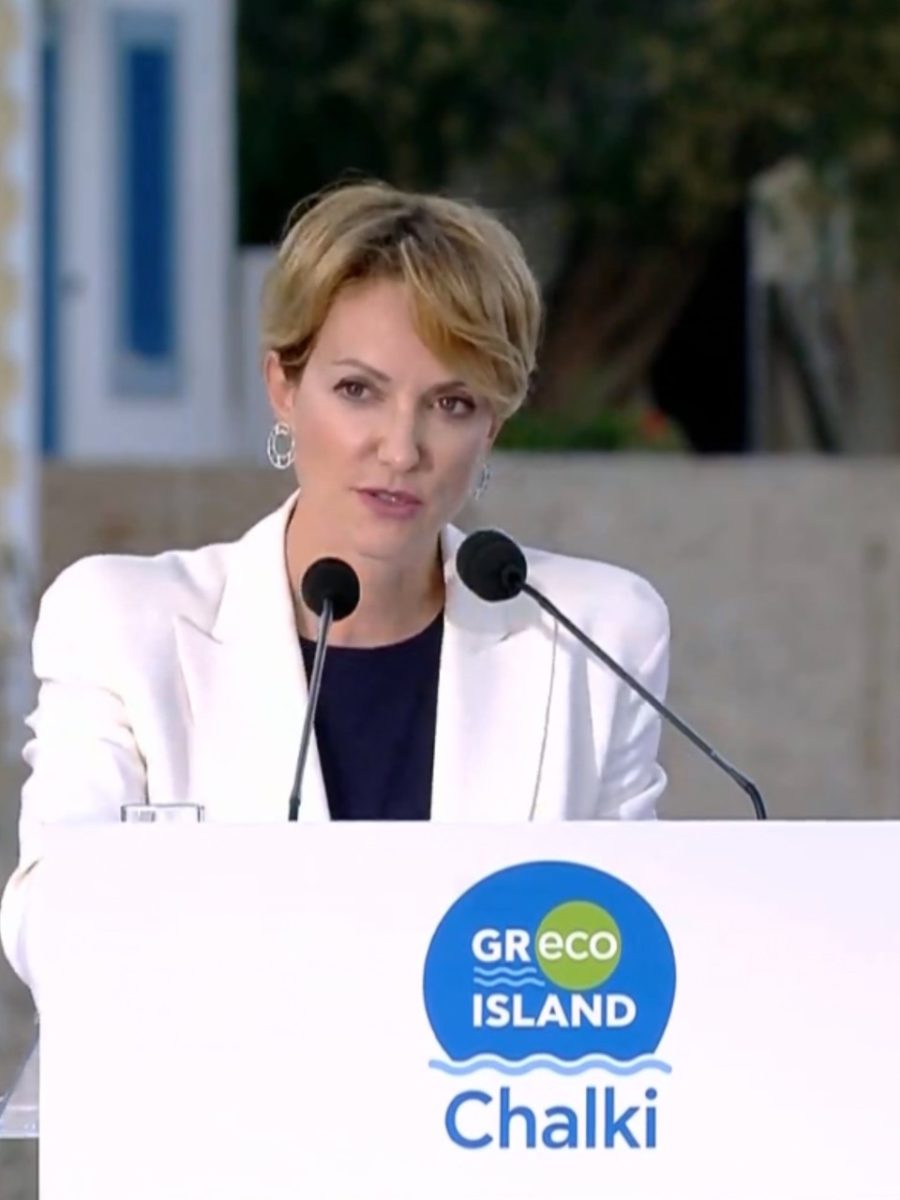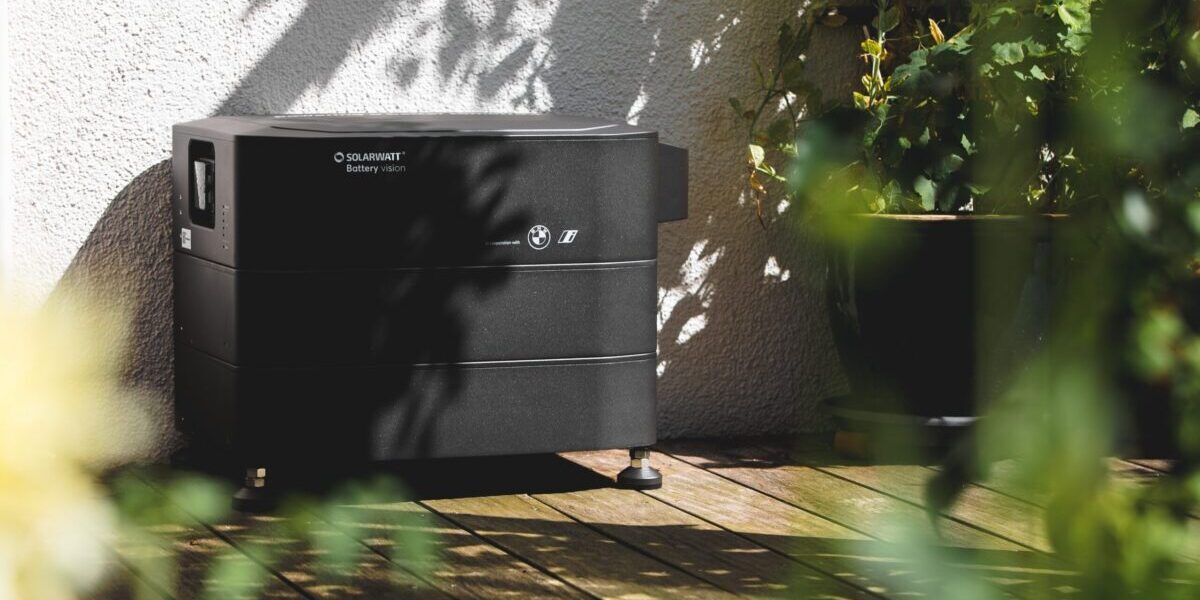The Greek government and the island of Halki hosted an inauguration of the island’s green energy community project, comprising an 1 MW solar PV farm, electric vehicles and a 5G telecommunications network. pv magazine presented the project in detail in July.
The pilot project is looking to foster clean and energy independent island communities. The project inaugurated today comprises a PV array that will provide free electricity to the members of the energy community, as well as electric cars and various Internet of Things (IoT) hardware and software – an attempt to link the islands’ public institutions, such as its school and the local health center, to mainland Greece and the world.
An addition to the project initially announced in July is a solar-powered boat, which was designed and built by a Greek family enterprise in the nearby island of Patmos. The electric boat will offer excursions around Halki, providing an ecotourism element to the project.
Among others, today’s inauguration ceremony was attended by Greece’s prime minister Kyriakos Mitsotakis; the Greek minister of the environment and energy Kostas Skrekas and France’s ambassador to Greece Patrick Maisonnave.
The Halki community energy project was described as a symbol of close Greek-French cooperation. The project has been funded by Greek and French entreprises – with a combined investment of €1.5 million. This upfront investment was donated to the local energy community, comprising the local institutions, households and businesses that wish to join the scheme free of charge.
“Our target for Halki is to act as an ambassador, a case-study that this [the concept of an island energy community] works and that it creates value for any community who joins our Gr-Eco Islands Initiative,” said Alexandra Sdoukou, the secretary general for energy and mineral resources at Greece’s energy ministry at the inauguration.
Sdoukou’s team is behind the development of the Halki project and the new government initiative that aims to green the country’s islands.
Benefits for the local power consumers
“Chalki has 592 electricity customers,” said Sdoukou, off which “482 are households, 96 are small business and 14 are public authorities. These customers are served by 11 different electricity suppliers and have an annual electricity consumption about 1600 to1700 MWh.” Therefore, the ministry concluded that a 1 MW photovoltaic park will be enough to cover the electricity needs of the island.
The members of the energy community are not directly connected to the PV park. Instead they will receive electricity credit for free commensurate to the solar park’s generated energy, which operates under virtual net metering. The generated solar power feeds the local electricity of the islands of Halki and Rhodes in in the southeastern Aegean Sea.
According to our calculations, Sdoukou added, a business owner participating in the energy community will only have to pay about €2 for the generation of the electricity it consumes during four months. This is down from approximately €240 that it paid before.
Similarly, argued Sdoukou who included copies of electricity bills in her presentation, a typical island household will pay about €6 for the electricity it consumes in four months, down from €235 it paid before.
“Understandably, the consumers will still have to pay for the regulated charges of their electricity bills, for example the fee for using the electricity network. However, the competitive part of their bills will be a gift from the sun,” concluded Sdoukou.
€100 million for Greece’s Gr-Eco Islands Initiative
Rather to the point, the secretary general commented that “an emerging issue is that replicating the Halki project across the Greek seas, will require funds.”
Critics could argue that the Halki project is entirely financed by donations and that corporations wouldn’t always donate systems and work. The secretary general provided an answer on this commenting that the government has “set up the so-called Decarbonisation Fund for the islands.”
Specifically, she added, the ministry has already “secured €100 million via the European Union’s Structural and Investment Funds, concerning the period 2021-2027. This €100 million pot will allow Greece to replicate the Chalki project in a dozen other Gre-Eco Islands.”
Moreover, Sdoukou claimed that the “ministry is currently in talks with the European Commission concerning Greece’s unused CO2 emissions from the EU’s Emissions Trading Scheme for the period 2013-2020. The compensation that Greece will receive as a result of emitting less CO2 in the past years is over a billion.”
Speaking to pv magazine after the inauguration ceremony, the secretary general commented that “Greece aims to direct these funds towards the Gre-Eco Islands Initiative and we have communicated this to the European Commission. So, the Commission and the ministry are currently in the process of defining the investment routes for these funds to green our islands.“
In the following months, Greece will publish an initial list of islands that the new initiative is targeting.
The Gr-Eco Islands Initiative concerns all Greek islands, however the government has decided to start with the smaller ones, such as remote Halki. These islands are typically not connected to the country’s main electricity grid and suffer from economic underdevelopment. A second list of islands under the same initiative will follow at a later stage.
This content is protected by copyright and may not be reused. If you want to cooperate with us and would like to reuse some of our content, please contact: editors@pv-magazine.com.



I started laughing out loud as I read this nonsense. Back in 2014/2015 I and my business partners were in discussions with various Greek ministries, the Greek regulator, the PPC and HEDNO. The proposal was de-carb the electricity supply to Astipalea – a non-interconnected Greek island. Cost to the Greek state – zero. Cost to Greek electricity users, zero. 1st stage of the project would have achieved 70% de-carb with later stages de-carbing 100% of the electricity supply and offering the prospect of a de-carb on transport. What happened? Nothing. The Greek authorities could not make up their minds – even though we had funding all lined up. Greece and its islands are a sunny and windy place. De-carb could be simple and quick & could deliver low cost elec to end users. The article suggests that this has, sort of, happened – albeit in a highly synthetic way i.e. a pile of free gifts. Well, there is no such thing as a free lunch and it strikes me that that is what the Greek authorities are still looking for.
PS: for those interested I have a long & entertaining e-mail trail.
Dear reader,
You write: “The article suggests that this has, sort of, happened”.
No, the article never suggested this. The article clearly reports that one single (and very small) isle got free electricity via solar.
The project cost is indeed covered via a number of Greek and French firms.
Similarly, the article never suggested that the Greek government’s policy is to electrify the Greek isles with sponsored projects. The government never told me so either.
On the contrary, the article suggests that Greece’s government has established funding routes (all info is provided in the article), aiming to direct financing to similar projects across the Greek seas.
I’m not representing any firm here, but I reckon sponsoring a small part of a small project (the total project cost was €1.5 million spread among several firms) is a clever idea of branding your product and services, and being ready to enter a new market when the initiative and the financing commences.
Finally, Greece’s government in 2021 is different from the government(s) back in 2014/15, which is the time you refer to. It might be the case that the new government has a different mindset and approach, and it is definitely the case that today there is a new discourse too.
Good luck with your business endeavors,
Ilias Tsagas
I have had similar experience, trying to introduce similar projects, in green water desalination, AMR (water meter reading), conversion of MSW (municipal solid waste) into water and energy, fuel monitoring and saving for the 44,000 public owned vehicles, military apps, etc.
We also provided the funding.
I visited Hellas o er 38 times in 4 years, spending will over half million euros in entertaining, accommodation, inland traveling and covering costs of visits to principals.
After losing money – lots of money and time – precious time, we were forced to give up.
This is the Hellenic reality.
My Group lost almost a million Euro trying to implement green technologies in Hellas, since 2005 and it is really pity more people to waste their time, money and effort.